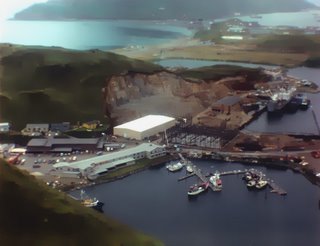MSA reauthorization news: an East Coast perspective

This is an article from the East Coast that gives a different perspective of the Act and the efforts to reauthorize it through 2012.
Maine fishermen are having the same trouble with it that Alaska fishermen are. They are worried that the small time fishermen and communities are going to go broke too. There appears to be some legislation on the horizon to ameliorate these effects.
The build-up of the processing sector at Dutch Harbor.
The legislation to tinker with and extend the Act are political solutions. They are also like band-aids on superficial problems. There's no way to nail down the effects of legislation as sweeping as this. There are no professors, bureaucrats, lawyers or witchdoctors that have the answers to what is going to happen to the fishing industry and the communities with something like this.
The original Act was ammended many times in order to protect the stocks of fish. The science was supposed to be down to a gnat's eyebrow. There are still stocks that are in trouble, maybe even more than before the Act. So does that give a lot of confidence in everything being hunky dory with the new amendment? I wouldn't say so.
In fact, the writing is on the wall in king crab gurry, that would suggest that there is big trouble brewing. And that would be for the politicians that don't include the fishermen in the decision making process on quota schemes. Political suicide comes to mind. Why not let fishermen decide if there even should be more quota schemes in the first place? The following quote is from the above hyperlinked article.
"According to Allen, the bill would accomplish those goals by giving fishermen a strong voice in the creation of any quota system and in the allocation of quotas. The bill also includes language aimed at preventing excessive concentration of quotas in a few hands, and calls for the quotas to be reviewed periodically. Crocker said NAMA, which represents mostly individual, small-boat fishermen supported Allen’s bill.
“If you want to keep vibrant, small fishing communities alive,” and insure access to the fisheries for future generations, he said, “it’s the best safeguard to be protected against the negative impacts of quotas.”
Then there certainly is a disconnect between the number of plant owners that want a quota and the many hundreds of fishermen who already have fishing priviledges. Personally I think the Harbor Masters deserve a quota share. I would say that the solution lies in whatever helps the most kids the most. And them being in the small communities near the fishing grounds, where most of the fishermen live.


0 Comments:
Post a Comment
<< Home